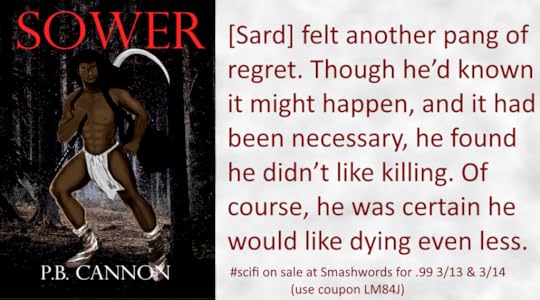P.B. Cannon's Blog
July 1, 2025
Smashwords July Summer/Winter Sale!
Now is your best chance to find my entire ebook collection for 75% off at @Smashwords as part of their Annual Summer/Winter Sale! Find my ebooks at www.smashwords.com/profile/view… and find many more at www.smashwords.com/shelves/promos all month! #SWSale2025 #Smashwords

March 12, 2025
“Sower”, on sale 3/13 & 3/14; .99 cents @ Smashwords!

Click here to buy with coupon LM84J
February 5, 2025
Discounted ebooks for Black History Month!

Click here and scroll down to see them all!
December 13, 2024
Smashwords 2024 End-of-Year Sale!

Now is your best chance to find my entire ebook collection discounted (HERE) at Smashwords as part of their End-of-Year Sale! My ebooks are 25%, 50%, & 75% off (all short stories are FREE!). There are many more to be had (HERE) through the end of the year! #smashwords #EOYsale24
September 10, 2024
A Small Gray Dot: FREE at Amazon from 9/10/2024 to 9/14/2024
If you like science fiction novels of apocalyptic/post-apocalyptic/dystopia, this $2.99 ebook is FREE at Amazon from 9/10/2024 to 9/14/2024. If you miss those dates, it’s also available to read for free at any time in Amazon’s KU. Go grab a copy and enjoy!
****************************************************************************************************
A Small Gray Dot
Could the fate of the world hinge on the actions of an ex-middle school English teacher?
Tennessee Murray, out of college for three years, has realized his ambition to teach, his dream of publishing a book, and is preparing to marry the love of his life. Things can only get better, right?
He thinks so. That is, he does until one June morning he steps out of his apartment and into an unexpected and unusual fog, and finds himself in a waking nightmare. Something has happened that is sudden, deadly, and inexplicable. It causes baffling, technological outages that make no sense, but worse of all, it brings death to billions. It touches everyone in one way or another and throws the world into utter chaos.
Life becomes a struggle, but it limps on, and unable to teach anymore, Tennessee finds something else he has a knack for: tracking. Seven years after what has become known simply as The Event, he sets out to find a missing young woman in a dystopian world that’s slowly sliding into the sewer. Like everyone else, he carefully sublimates the thing that changed everything, and keeps his mind strictly on the task at hand, so locating the woman is all he’s trying to do.
But, he’s thrown a curve when he inadvertently stumbles across the cause of the event that brought the world to its knees, and he is yanked relentlessly into the understanding that things are about to get a whole lot worse. Can Tennessee, and a ragtag crew he has assembled, stop the total annihilation that’s bearing down on the world?
September 2, 2024
A Small Gray Dot: FREE at Amazon from 9/10/2024 to 9/14/2024
If you like science fiction novels of apocalyptic/post-apocalyptic/dystopia, this $2.99 ebook is FREE at Amazon from 9/10/2024 to 9/14/2024. If you miss those dates, it’s also available to read for free at any time in Amazon’s KU. Go grab a copy and enjoy!
****************************************************************************************************
A Small Gray Dot
Could the fate of the world hinge on the actions of an ex-middle school English teacher?
Tennessee Murray, out of college for three years, has realized his ambition to teach, his dream of publishing a book, and is preparing to marry the love of his life. Things can only get better, right?
He thinks so. That is, he does until one June morning he steps out of his apartment and into an unexpected and unusual fog, and finds himself in a waking nightmare. Something has happened that is sudden, deadly, and inexplicable. It causes baffling, technological outages that make no sense, but worse of all, it brings death to billions. It touches everyone in one way or another and throws the world into utter chaos.
Life becomes a struggle, but it limps on, and unable to teach anymore, Tennessee finds something else he has a knack for: tracking. Seven years after what has become known simply as The Event, he sets out to find a missing young woman in a dystopian world that’s slowly sliding into the sewer. Like everyone else, he carefully sublimates the thing that changed everything, and keeps his mind strictly on the task at hand, so locating the woman is all he’s trying to do.
But, he’s thrown a curve when he inadvertently stumbles across the cause of the event that brought the world to its knees, and he is yanked relentlessly into the understanding that things are about to get a whole lot worse.
Can Tennessee, and a ragtag crew he has assembled, stop the total annihilation that’s bearing down on the world?
August 20, 2024
Sower: Free at Amazon from 8/20/24 to 8/24/24
Sower: A Novel of Science Fiction
FREE from 8/20/24 to 8/24/24
Earth has been devastated, and the job of restoring it can be dangerous but the Sower is young, smart, and resilient. All he has to do is hold his own with primitive males when caught in their camp, survive a night with eight native women, avert a new threat that has trapped his AI partner, and keep it from spreading and wiping out all life on Earth.
July 2, 2024
Smashwords 2024 July Summer/Winter Sale!

Now is your best chance to find my entire ebook collection for a promotional price at Smashwords as part of their Annual Summer/Winter Sale! Find my ebooks at https://www.smashwords.com/profile/view/pbcannon. Some are 50% off, and get any boxed set for 75% off! All short stories are FREE!
(Find many more deals at https://www.smashwords.com/shelves/promos all month! #SWSale2024 #Smashwords)
May 22, 2024
Why I Don’t Like Math
I don’t like math. Yeah, I know. A lot of people don’t like math. I don’t know why other people don’t like it, but I know why I don’t.
It’s not because it’s hard, or confusing – though it certainly can be – but I lay the blame at the feet of my fourth-grade teacher.
Before I go any further, let me just say that I have nothing but respect for teachers. They have a hard job to do and I don’t want to take away from that. Heck, my sister, who’s retired now, was a teacher. She was, in fact, a math teacher, and a very good one, not to mention that some of my classmates from high school became teachers. Those brave souls all get a bow of veneration from me.
But sometimes, I think there are folk who aren’t as cut out for it as others, and the following is why I blame my fourth-grade teacher for my dislike of math.
I don’t know the order in which kids are taught things in elementary school now, but when I was there (back in the ancient days, as my daughter would say, just after they invented water) long division was learned in the fourth grade.
Now, up until the fourth grade, I pretty much liked math, or rather arithmetic, as that’s what it is at that stage. There was no public kindergarten in our school system at that time, and my family was much too poor to pay for a private one, so my mother, along with teaching me my ABC’s and to read, long before I ever started first grade, also taught me to count to a hundred and how to write my numbers, and to do simple additions and subtractions, so I had no problems with arithmetic. Until fourth grade. And I didn’t really have a problem with it then, however, apparently my fourth-grade teacher thought I did, which subsequently made me think I did.
She went over the long division method, showed the class how to work such problems, and gave us a sheet with four problems to take home, to be turned in the next day. I remember being excited about learning something new, and that night, I eagerly worked my problems the way I’d been taught in class. I showed my work to my mother, and she went over it and gave me a big hug for having all four problems correct. I was happy.
The next day, we turned in our homework, and the teacher said she would go over our papers and give them back to us after lunch. I looked forward to that big “A” I knew was going to be on my paper.
I got an “F”.
I saw some of the other kids’ papers, and nobody had an “A” but I was the only one with an “F”.
Well. It was all I could do to keep from crying, and I was ashamed to take it home to my mother because what that “F” meant to me was, not only did I not understand how to work long division, neither did my mother, and that was something I just couldn’t fathom because I’d thought my mother was the smartest person in the world. How could she have been so wrong? Getting an “F” in something that she’d declared to be correct skewed my view of her intellect, and I never again showed her any of my homework.
When my mother asked about it, I lied and told her I got an “A”. She, of course wanted to see it, so I told another lie and said I dropped the paper and it went down a sewer opening (see – I was already on my way to being a fiction writer! I actually tore the paper to shreds and tossed it into a trashcan). Bless her heart, she believed me. Sigh.
It never occurred to me to ask the teacher why she’d given me the bad grade because back then (it was the nineteen-fifties – right after dirt came into being) you didn’t question your teacher when she gave you an “F”. Normally, the teacher would tell you why, but for whatever reason, in this case, she never did (and I was so hurt that I never mentioned it to anybody. Hey, I was eight years old – it just never occurred to me that I should). By the time I figured it out, it was much too late – by then, I didn’t like arithmetic. Which, in later years, had segued into disliking math.
In fact, I never got a decent grade in arithmetic the whole fourth grade year because there was always at least one long division problem included in any classroom work or homework, and I refused to work any of those, not even in class. My reasoning was that since I’d gotten all those wrong at the beginning, and the teacher kept showing us how to do them the same way, then I must not be very smart in arithmetic.
The only reason I passed fourth grade was because I did well in everything else. Fourth grade was also when we began doing simple fractions, and oddly enough, I didn’t have a problem with those, and the teacher, for some reason, never questioned why I could do those but not long division problems.
By the next year, I finally began to work the long division problems but by then I didn’t like arithmetic, and always rushed through any of it as fast as I could. I never regained the confidence I’d had in myself for being able to do arithmetic prior to being introduced to long division, so I never knew if what I was doing was correct, and I never had the courage to ask. My arithmetic grades ranged from so-so to pretty good, depending on how much time I took to work the problems. I had a preference for reading and writing and I did very well in Language Arts – I could diagram the mess out of a sentence, and conjugate any verb in existence. And in later grades I did great in History, Civics, English, Literature, etc. Math? Nope.
I have to admit: getting all those long division problems wrong really bugged me, and I never forgot the incident. But it was a long time before I finally figured out why my teacher gave me an “F” on that first homework paper. It was simple: I was the only one who’d gotten every problem correct, so she’d assumed someone had worked them for me and that I’d simply copied them over to my paper (I remember thinking: sorry Mom, you really were smart!)
The only reason I made that leap to understanding was because one day, years later in high school, I was sitting in a geometry class, wishing I was anywhere else, and noticed a classmate was copying off someone’s paper (Heh, no, not mine, somebody a whole better at it than I was), and it was as if a circuit closed in my brain, and I knew what had happened all those years ago. No, it didn’t make me suddenly fall in love with math, but I knew with certainty why I didn’t like it (and, I still don’t).
Not liking it doesn’t mean I didn’t learn. What it meant was that I never learned any more of it than what I had to in order to pass a class, and promptly forgot it as soon as I didn’t need it anymore.
And, who knows, if it hadn’t been for my fourth grade teacher, I might’ve been a great mathematician, or scientist, or…nah. Who am I kidding?…I like to write science fiction and fantasy too much for that. Besides, after seventh grade, I hated school.
But that’s another story.
Why I Hated School
During my seventh grade year, I began hating school. Before then, I still pretty much enjoyed going, though some of my original eagerness had cooled off in the fourth grade in the wake of an incident that I’ve previously blogged about (see Why I Don’t Like Math).
Here’s what happened to snuff my desire to get up every morning and look forward to spending most of the day enclosed in a brick building learning one subject or another.
I was eleven years old at the beginning of my seventh-grade year, and excited about going to junior high school (it wasn’t called “middle” school back in the fifties; we had three divisions of school: elementary was grades one to six; junior high was grade seven to nine, and of course, there was high school which was from grade ten to twelve). I was looking forward to learning to go to different classrooms for each subject (wasn’t any of that in elementary school) even though on the first day of school I wasn’t feeling well.
On the second day of school, I, unfortunately, learned why I hadn’t been feeling well: my appendix ruptured. I was in the hospital for two weeks and was put on bed rest for four weeks after that. I should’ve been able to get back in school before Halloween of that year, however, I didn’t get back until after Christmas because that was the year the city buses went on strike.
Such a strike nowadays wouldn’t affect getting to school because kids now ride big yellow school buses, but at that time, short of walking or unless you had a car, the city bus was the only way to get from my house to my assigned school which was clean across town from where I lived. We didn’t have a car, and my mom wouldn’t allow me to walk so I was stuck at home until the strike was over.
Now you may think that being unable to get there was the reason why my enthusiasm for going to school waned. After all, while I was out ill, I wasn’t sent a tutor (I wasn’t aware until years later that one should’ve been sent), and even if I’d had one, the tutor wouldn’t have remained while I was out due to the strike, so I would’ve been lagging far behind after being out for half the school year. You’d be wrong. My mom was my tutor for that period of time, so I was up to date on the school-work.
Bear with me, I’m getting to the cause of my disaffection with school.
I showed up on the first day after the New Year, relieved to be back. I was all brushed and polished and ready to go, my mom had even allowed me to put on a smattering of lipstick. My homeroom teacher (who shall remain nameless), a man whom I’d only met briefly at the beginning of the school year, welcomed me back. I noticed he kept glancing at me, but I thought nothing of it.
He asked me to remain when the bell rang for my first class and I thought it was to go over my schedule with me. However, instead, to my consternation, he began to lecture me because I was wearing that barely discernable amount of lipstick. Turned out seventh-graders weren’t allowed to wear it, a fact I hadn’t known because I was out sick. He told me that the punishment for breaking this rule was paddling (corporal punishment in schools was still very much in effect in nineteen fifty-eight).
Because I’d been unaware of this rule, I thought I was simply being warned not to do it again. I explained that since I now knew, I’d be sure and not wear lipstick to school again. Wrong. The bastard pulled out a paddle and bent me over a desk and proceeded to give me five whacks across my behind which were apparently how many you got for wearing lipstick to school.
I was stunned. I was also embarrassed because there were two other students – boys – watching, and waiting to get their whacks for whatever school rule they’d fractured.
I was not a violent kid, but at that moment, I wished with all my might that his head would explode. Needless to say, I did not have a good rest of the year at that school. I was humiliated because all the kids knew I’d been paddled, and some of them teased me which didn’t help anything. I became quiet and stand-offish. I didn’t tell my mom because I was too ashamed to do so, and there was no message sent home (no auto-calls then, and even had there been, we were too poor to have telephone service at that time), so I suspect she never knew.
Years later, looking back, I knew I should’ve told her but at the time, I was afraid she’d give me grief for having gotten paddled. Yeah. Stupid, I know, but those were different times.
Now, as I said in my post about hating math, I respect teachers and recognize that they have a hard job (my sister is a retired teacher) but, some people are not suited to be teachers. My seventh grade homeroom teacher certainly wasn’t, and I lost all respect for him.
What this incident had the effect of doing was to make me wary of all teachers, and to absolutely ruin school for me. After that, I hated going, and though I had to go to homeroom, I refused to have anything to do with that teacher, even refusing to answer roll call, which of course, caused even more trouble for me. Eventually, I began skipping school and did not finish the seventh grade. I got into a heap of trouble that year.
It’s a long story that I won’t go into right now, but after I repeated seventh at a different school, I tested out of eighth grade and was, instead, placed in ninth. I suppose I should’ve been happy, but I wasn’t.
I’d gotten over the physical pain of being unfairly beaten – and in front of other students at that – but I’d not gotten over the psychological damage. In high school, I dropped out in tenth grade. I went back the next year and even made good grades when I felt like it, but I dropped out altogether in twelfth. It was a long time before I finally understood exactly why I didn’t like school, and by then it was much too late though I later got my GED, and even some college (after I was an adult, and married with children).
I’m a great-grandmother now, and have long since gotten over it, but I sometimes wonder how my life might’ve been different if I’d had a seventh-grade teacher worthy of the title.



